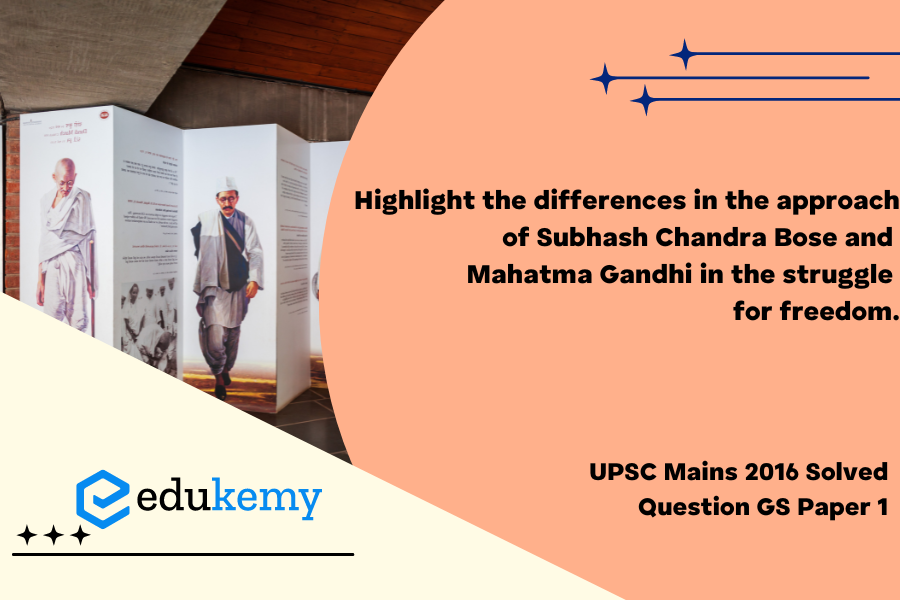The quest for Indian independence witnessed the dynamic interplay of two stalwart leaders, Subhash Chandra Bose and Mahatma Gandhi, each contributing to the struggle with distinctive approaches that reflected their divergent ideologies and convictions. Mahatma Gandhi, a proponent of nonviolent civil disobedience, became the emblematic figure of the Indian National Congress and the broader freedom movement. His philosophy of Ahimsa, or nonviolence, emphasized the transformative power of love and resistance to oppression without resorting to aggression. In contrast, Subhash Chandra Bose, driven by a fervent belief in the urgency of armed resistance, advocated for a more assertive and militant approach. Bose’s leadership led to the formation of the Indian National Army (INA), comprised of soldiers who aligned with his vision of an armed struggle against British rule. While Gandhi sought to galvanize the masses through peaceful means and moral persuasion, Bose, also known as Netaji, pursued a path of armed insurrection, believing it to be a pragmatic response to the imperialistic forces. The dichotomy in their methods and ideologies illuminates the complexity of the freedom struggle, underscoring the multifaceted nature of India’s battle for independence.
Tag: The Freedom struggle.
Contents
Decoding the Question:
- In the Introduction, try to write briefly about Mahatma Gandhi and Subhash Chandra Bose.
- In Body, mention the differences in the approach of Subhash Chandra Bose and Mahatma Gandhi in the struggle for freedom.
- Conclude with the fact that, despite all the differences in ideologies, both these great men admired and respected each other.
Answer:
Mahatma Gandhi and Subhas Chandra Bose were two legendary personalities, gigantic in their political moral and ethical stature. In 1915, soon after his return from South Africa, Gandhi became the unquestioned leader of India’s freedom movement and Indian National Congress. Subhas Chandra Bose, younger to Gandhi by 28 years who had resigned from the coveted Indian Civil Service with the resolute aim and determination to devote himself entirely to the fight for India’s freedom.

The differences in the approach of Subhash Chandra Bose and Mahatma Gandhi in the struggle for freedom:
| Particulars | Mahatma Gandhi Approach | Subhas Chandra Bose Approach |
| Approach | Gandhi was a staunch advocate of nonviolent civil disobedience as the means to achieve independence, believing in the power of passive resistance and moral force. | Bose advocated a more militant and radical approach to achieving independence, emphasising direct action and armed struggle against British colonial rule. |
| Emphasis | He stressed the importance of truth, nonviolence, and self-discipline as the foundation of the struggle and advocated for personal and societal transformation. | Bose placed a strong emphasis on nationalism and believed that it was necessary to prioritise India’s interests over other concerns. |
| Support | Gandhi’s approach involved mass mobilization through campaigns such as the Salt March and Quit India Movement, which aimed to unite the masses in peaceful protests against British policies. | Bose sought support from foreign powers, including Nazi Germany and Imperial Japan, to aid India’s liberation struggle. |
| Ideals | Gandhi believed that India should achieve independence through self-reliance, economic self-sufficiency, and self-governance at the grassroots level. | He believed in taking swift and decisive action, even if it meant using force, to expel the British from India. |
| Struggle for Freedom | He sought to unite all sections of Indian society, transcending divisions of religion, caste, and class, in the struggle for freedom. | Bose organized and led the Indian National Army (INA) comprised of Indian soldiers who had defected from the British Indian Army, aiming to use military force against the British. |
Despite all the differences in ideologies, both these great men admired and respected each other. In 1942 Gandhi called Subhash Bose the “Prince among the Patriots” for his great love for the country. Bose too admired Gandhi and in a radio broadcast from Rangoon in 1944, he called Mahatma Gandhi “The Father of Our Nation.” Cue must be taken from these two great leaders’ tolerance and respect towards each other even after serious differences of opinion.
In case you still have your doubts, contact us on 9811333901.
For UPSC Prelims Resources, Click here
For Daily Updates and Study Material:
Join our Telegram Channel – Edukemy for IAS
- 1. Learn through Videos – here
- 2. Be Exam Ready by Practicing Daily MCQs – here
- 3. Daily Newsletter – Get all your Current Affairs Covered – here
- 4. Mains Answer Writing Practice – here


